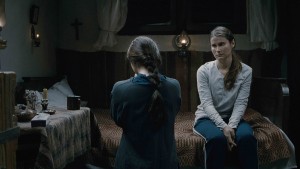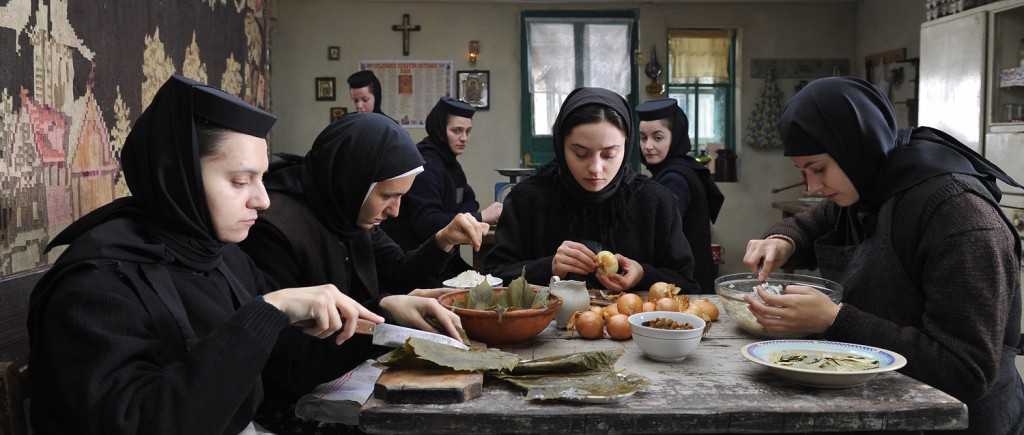Film Review: A Venture into the Elemental — “Beyond the Hills”
Beyond the Hills is not the horror film the trailer seems to advertise, but it is certainly horrific.
By Tim Jackson
In his new film, Beyond The Hills, the Romanian director Cristian Mungiu once again explores a friendship between two women in the context of a clash between personal responsibility and institutional law. In his previous film, 4 Months, 3 Weeks and 2 Days, he tells the story of two university students: one is trying to arrange to have an abortion as her friend is drawn into the politics of the decision. It is set in 1987 during the waning days of Ceausescu’s repressive leadership in communist Romania. Abortion was illegal, and this sad story unfolds calmly and deliberately, a riveting character study that put the film on many top 10 lists for 2007. It was voted best foreign film by many critics and won the Palm d’Or at the Cannes Festival.
Similarly, his new film is a deliberately paced and beautifully textured story. Mungiu shoots and edits with agile minimalism, giving the viewer time to read the nuances of behavior and explore the textures of the characters’ environment. Two women, Alina (Cristina Flutur) and Voichita (Cosmina Stratan), having spent a close and protective relationship as children in an orphanage, reunite many years later in an isolated, Orthodox convent in Romania. Voichita has been living a sparse life of solemnity, work, and prayer with a cluster of other religious sisters and a kindly Mother Superior under the watchful eye of a single old priest. It is clear that in their past Alina was the protector and defender of her introverted childhood friend. Now, returning after years of living in Germany, Alina is irascible, impatient, and insecure about her future, desperate for friendship and support. There are strong hints that their relationship had been physically intimate; a sin for which Voichita suffers from confusion and guilt.
To make the situation more difficult, the volatile Alina will not be quelled by the decisions made by the priest whom Voichita calls “Papa.” “Please don’t call him Papa, he’s not your father,” she says. Her distain and temper grow worse; she eventually needs to be restrained by the nuns. Eventually she is brought, bound and gagged, to a local hospital. After an emotional entreaty to the priest by Voichita, Alina is permitted to return to the convent if she will accept church Orthodoxy. She relents at first, makes a confession—exactly what we don’t know—and goes through a checklist of 464 religious sins with the nuns. It is a sad and hysterical list that includes a range of transgressions, such as absence from religious services, impertinence, and contrariness. We are spared the entire list. But from there things get much worse.
The film is based on novels by Tatiana Niculescu Bran that were based on a true story. In June 2005, a Romanian nun named Irina Maricica Cornici died during an exorcism ritual. A priest and four nuns were charged with murder. The priest claimed that the ritual was performed at the request of the victim’s brother, who was unhappy that his sister, who had been treated for schizophrenia, continued to have mental problems. I won’t say that this is exactly what happens in film, but Mungiu provides a fascinating examination of the limits and abuses of religious faith and of superstition and law. There are no good guys or bad guys. It’s not really a critique of religion, although nonbelievers may have a good case.
The clash between a passionately stubborn secularism and rigid observance delves into deep and disturbing themes. Beyond the easy criticism of the church there is a question of empathy and compassion. They are orphans in a country where, as the director describes it, “longtime exposure to an endless succession of misfortunes and atrocities of all kinds has led to a breed of inert people who have lost their normal reactions in front of normal stimuli.” Each of these women seeks solace in their own way. Voichita has relinquished personal responsibility to God’s law and the wisdom of “Papa.” The priest refers all decisions to the prescriptions of church law. The Mother Superior is conflicted, but she knows better than to challenge authority’s word. Irina, who has lived in the secular world, has a pathological need to bond with her friend. She goes through the motions of accepting the priest’s demands, at times taking his pronouncements to absurd extremes, but underneath is a malignant distain and skepticism for what she sees as a hypocritical institution that has drained the humanity from her friend. Alina is disturbed but not diabolical. For the priest, rebellion can only be the devil’s work; the default solution is to turn to ritual. At no time do compassion and human understanding shape his choices. If Alina is out of control, then it must be demonic interference.
Mungui’s confident, careful directorial style draws the viewer into a glimpse of a simple world where obeisance to the word of God, faith in His wisdom, dedication to a chaste life and the elemental rituals of work and worship reign supreme. Water is drawn from a well; there is no electricity. All labor is done by hand. Every frame is rich with the textures of fabric, wood, stone, hand tools, and the chill of the desolate cold air. The film crew constructed the monastery and the houses during winter in extremely cold conditions. Long scenes were often shot 10 or 15 times. At times up to 40 takes were committed to film. This rigorous production style renders the antiquated world tangible and gives the cast’s performances a grim authenticity.
It is satisfying to have the time to concentrate on the details in the images, delight in the simple peasant faces, and imagine the conflicting motivations of each character. This is not the horror film the trailer seems to advertise, but it is certainly horrific. Answers refuse to be made easy, and the viewer is drawn deeper and deeper into the swirl of passions. As with his previous film, Mungiu’s final image becomes a powerful summation of what we are left with. Sit tight until the frame cuts to black. Then the conversation begins.
Tim Jackson was an assistant professor of Digital Film and Video for 20 years. His music career in Boston began in the 1970s and includes some 20 groups, recordings, national and international tours, and contributions to film soundtracks. He studied theater and English as an undergraduate, and has also has worked helter skelter as an actor and member of SAG and AFTRA since the 1980s. He has directed three feature documentaries: Chaos and Order: Making American Theater about the American Repertory Theater; Radical Jesters, which profiles the practices of 11 interventionist artists and agit-prop performance groups; When Things Go Wrong: The Robin Lane Story, and the short film The American Gurner. He is a member of the Boston Society of Film Critics. You can read more of his work on his blog.
Tagged: 3 Weeks and 2 Days, 4 Months, Beyond the Hills, Cristian Mungiu, Romanian


